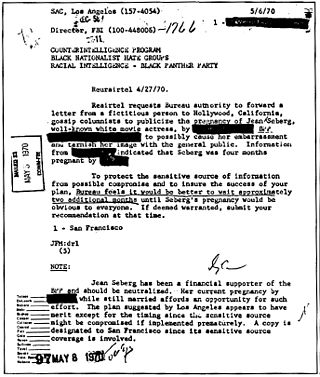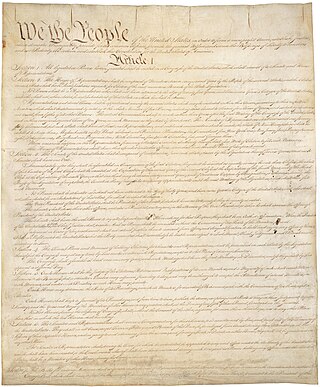
The American Civil Liberties Union (ACLU) is an American nonprofit organization founded in 1920 "to defend and preserve the individual rights and liberties guaranteed to every person in this country by the Constitution and laws of the United States". The ACLU works through litigation and lobbying and has over 1,800,000 members as of July 2018, with an annual budget of over $300 million. Affiliates of the ACLU are active in all 50 states, Washington, D.C., and Puerto Rico. The ACLU provides legal assistance in cases where it considers civil liberties at risk. Legal support from the ACLU can take the form of direct legal representation or preparation of amicus curiae briefs expressing legal arguments when another law firm is already providing representation.

COINTELPRO was a series of covert and illegal projects actively conducted by the United States Federal Bureau of Investigation (FBI) aimed at surveilling, infiltrating, discrediting, and disrupting domestic American political organizations. FBI records show COINTELPRO resources targeted groups and individuals the FBI deemed subversive, including feminist organizations, the Communist Party USA, anti–Vietnam War organizers, activists of the civil rights and Black power movements, environmentalist and animal rights organizations, the American Indian Movement (AIM), Chicano and Mexican-American groups like the Brown Berets and the United Farm Workers, independence movements, a variety of organizations that were part of the broader New Left, and white supremacist groups such as the Ku Klux Klan and the far-right group National States' Rights Party.

The Constitution of the United States is the supreme law of the United States of America. It superseded the Articles of Confederation, the nation's first constitution, in 1789. Originally comprising seven articles, it delineates the national frame and constraints of government. The Constitution's first three articles embody the doctrine of the separation of powers, whereby the federal government is divided into three branches: the legislative, consisting of the bicameral Congress ; the executive, consisting of the president and subordinate officers ; and the judicial, consisting of the Supreme Court and other federal courts. Article IV, Article V, and Article VI embody concepts of federalism, describing the rights and responsibilities of state governments, the states in relationship to the federal government, and the shared process of constitutional amendment. Article VII establishes the procedure subsequently used by the 13 states to ratify it. The Constitution of the United States is the oldest and longest-standing written and codified national constitution in force in the world today.

The Fourth Amendment to the United States Constitution is part of the Bill of Rights. It prohibits unreasonable searches and seizures. In addition, it sets requirements for issuing warrants: warrants must be issued by a judge or magistrate, justified by probable cause, supported by oath or affirmation, and must particularly describe the place to be searched and the persons or things to be seized.

The USA PATRIOT Act was a landmark Act of the United States Congress, signed into law by President George W. Bush. The formal name of the statute is the Uniting and Strengthening America by Providing Appropriate Tools Required to Intercept and Obstruct Terrorism Act of 2001, and the commonly used short name is a contrived acronym that is embedded in the name set forth in the statute.
Civil liberties are guarantees and freedoms that governments commit not to abridge, either by constitution, legislation, or judicial interpretation, without due process. Though the scope of the term differs between countries, civil liberties may include the freedom of conscience, freedom of press, freedom of religion, freedom of expression, freedom of assembly, the right to security and liberty, freedom of speech, the right to privacy, the right to equal treatment under the law and due process, the right to a fair trial, and the right to life. Other civil liberties include the right to own property, the right to defend oneself, and the right to bodily integrity. Within the distinctions between civil liberties and other types of liberty, distinctions exist between positive liberty/positive rights and negative liberty/negative rights.
In American political discourse, states' rights are political powers held for the state governments rather than the federal government according to the United States Constitution, reflecting especially the enumerated powers of Congress and the Tenth Amendment. The enumerated powers that are listed in the Constitution include exclusive federal powers, as well as concurrent powers that are shared with the states, and all of those powers are contrasted with the reserved powers—also called states' rights—that only the states possess.
United States v. Cruikshank, 92 U.S. 542 (1876), was a major decision of the United States Supreme Court ruling that the U.S. Bill of Rights did not limit the power of private actors or state governments despite the adoption of the Fourteenth Amendment. It reversed the federal criminal convictions for the civil rights violations committed in aid of anti-Reconstruction murders. Decided during the Reconstruction Era, the case represented a major defeat for federal efforts to protect the civil rights of African Americans.
The Lochner era was a period in American legal history from 1897 to 1937 in which the Supreme Court of the United States is said to have made it a common practice "to strike down economic regulations adopted by a State based on the Court's own notions of the most appropriate means for the State to implement its considered policies". The court did this by using its interpretation of substantive due process to strike down laws held to be infringing on economic liberty or private contract rights. The era takes its name from a 1905 case, Lochner v. New York. The beginning of the era is usually marked earlier, with the Court's decision in Allgeyer v. Louisiana (1897), and its end marked forty years later in the case of West Coast Hotel Co. v. Parrish (1937), which overturned an earlier Lochner-era decision.

David D. Cole is the National Legal Director of the American Civil Liberties Union (ACLU). Before joining the ACLU in July 2016, Cole was the Hon. George J. Mitchell Professor in Law and Public Policy at the Georgetown University Law Center from March 2014 through December 2016. He has published in various legal fields including constitutional law, national security, criminal justice, civil rights, and law and literature. Cole has litigated several significant First Amendment cases in the Supreme Court of the United States, as well a number of influential cases concerning civil rights and national security. He is also a legal correspondent to several mainstream media outlets and publications.
In the United States, censorship involves the suppression of speech or public communication and raises issues of freedom of speech, which is protected by the First Amendment to the United States Constitution. Interpretation of this fundamental freedom has varied since its enshrinement. Traditionally, the First Amendment was regarded as applying only to the Federal government, leaving the states and local communities free to censor or not. As the applicability of states rights in lawmaking vis-a-vis citizens' national rights began to wane in the wake of the Civil War, censorship by any level of government eventually came under scrutiny, but not without resistance. For example, in recent decades, censorial restraints increased during the 1950s period of widespread anti-communist sentiment, as exemplified by the hearings of the House Committee on Un-American Activities. In Miller v. California (1973), the U.S. Supreme Court found that the First Amendment's freedom of speech does not apply to obscenity, which can, therefore, be censored. While certain forms of hate speech are legal so long as they do not turn to action or incite others to commit illegal acts, more severe forms have led to people or groups being denied marching permits or the Westboro Baptist Church being sued, although the initial adverse ruling against the latter was later overturned on appeal to the U.S. Supreme Court case Snyder v. Phelps.

The history of the USA PATRIOT Act involved many parties who opposed and supported the legislation, which was proposed, enacted and signed into law 45 days after the September 11 terrorist attacks in 2001. The USA PATRIOT Act, though approved by large majorities in the U.S. Senate and House of Representative, was controversial, and parts of the law were invalidated or modified by successful legal challenges over constitutional infringements to civil liberties. The Act had several sunset provisions, most reauthorized by the USA PATRIOT Improvement and Reauthorization Act of 2005 and the USA PATRIOT Act Additional Reauthorizing Amendments Act. Both reauthorizations incorporated amendments to the original USA PATRIOT Act, and other federal laws.
The Tenther movement is a social movement in the United States, whose adherents espouse the political ideology that the federal government's enumerated powers must be read very narrowly to exclude much of what the federal government already does, citing the Tenth Amendment to the United States Constitution in support of this. The text of the amendment reads:
The powers not delegated to the United States by the Constitution, nor prohibited by it to the States, are reserved to the States respectively, or to the people.
The Partnership for Civil Justice Fund (PCJF) is a nonprofit progressive legal organization based in Washington, D.C. Founded by Carl Messineo and Mara Verheyden-Hilliard, the organization focuses on cases regarding free speech and dissent, domestic spying and surveillance, police misconduct, and government transparency.
Constitutionalism is "a compound of ideas, attitudes, and patterns of behavior elaborating the principle that the authority of government derives from and is limited by a body of fundamental law".

Klayman v. Obama, 957 F.Supp.2d 1, was a decision by the United States District Court for District of Columbia finding that the National Security Agency's (NSA) bulk phone metadata collection program was unconstitutional under the Fourth Amendment. The ruling was later overturned on jurisdictional grounds, leaving the constitutional implications of NSA surveillance unaddressed.

American Civil Liberties Union v. Clapper, 785 F.3d 787, was a lawsuit by the American Civil Liberties Union (ACLU) and its affiliate, the New York Civil Liberties Union, against the United States federal government as represented by then-Director of National Intelligence James Clapper. The ACLU challenged the legality and constitutionality of the National Security Agency's (NSA) bulk phone metadata collection program.

The militarization of police is the use of military equipment and tactics by law enforcement officers. This includes the use of armored personnel carriers (APCs), assault rifles, submachine guns, flashbang grenades, sniper rifles, and SWAT teams. The militarization of law enforcement is also associated with intelligence agency–style information gathering aimed at the public and political activists and with a more aggressive style of law enforcement. Criminal justice professor Peter Kraska has defined militarization of police as "the process whereby civilian police increasingly draw from, and pattern themselves around, the tenets of militarism and the military model".
Elrod v. Burns, 427 U.S. 347 (1976), is a United States Supreme Court decision regarding political speech of public employees. The Court ruled in this case that public employees may be active members in a political party, but cannot allow patronage to be a deciding factor in work related decisions. The court upheld the decision by the 7th Circuit Court of Appeals ruling in favor of the respondent.
Defending Rights & Dissent (DRAD) is a national not-for-profit advocacy organization in the United States, dedicated to defending civil liberties, exposing government repression, and protecting the right of political dissent. DRAD was formed as the merger of the Defending Dissent Foundation (DDF) and the Bill of Rights Defense Committee (BORDC). DRAD is currently active in defending the right to protest, opposing political surveillance, and campaigning against the prosecution of national security whistleblowers.









